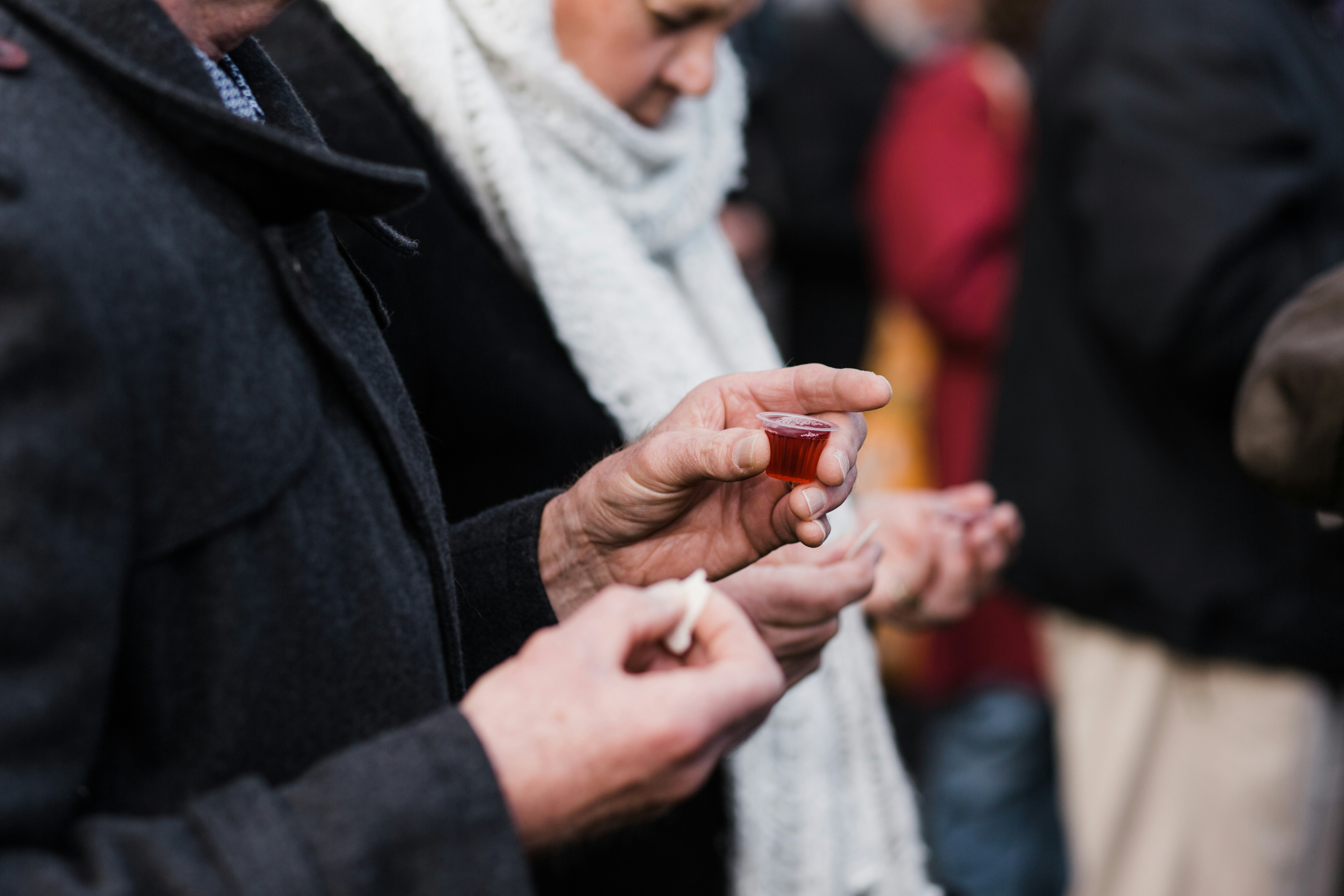
Our Beliefs
Our statement of beliefs is not an exhaustive statement of all doctrine, but rather a summary of some essential elements of the Christian faith laid out in Scripture. It is the affirmation of this statement that holds our fellowship in unity and guards the purity of our church.
I. The Scriptures
We believe that the Holy Bible, consisting of the Scriptures of the Old and New Testaments, alone is the Word of God, being fully written under the inspiration of the Holy Spirit, and therefore is without error in the original manuscripts and has supreme authority in all matters of faith and conduct.
Psalm 19:7; Isaiah 40:8; Mark 13:31; John 20:31; Acts 20:32; 2 Timothy 3:16-17; 2 Peter 1:20-21
II. God
There is but one God, the Maker, Preserver and Ruler of all things, having in and of Himself, all perfections, and being infinite in them all; and to Him all creatures owe the highest love, reverence, and obedience
Deut. 6:4; Ps. 145:3; John 1:3; 1 Cor. 8:4-6; 1 Tim. 1:17
III. The Trinity
The Scriptures reveal that the one God eternally exists in three persons: the Father, the Son, and the Holy Spirit. Each person is distinct, but God is without division of nature, essence, or being.
Matt. 3:16-17; 28:19; 2 Cor. 13:14
IV. Providence
God, from eternity, decrees or permits all things that come to pass, and perpetually upholds, directs, and governs all creatures and all events; yet so as not in any wise to be the author or approver of sin, nor to destroy the free will and responsibility of intelligent creatures
Isa. 46:9-11; Prov. 16:33; Col. 1:17; Heb. 1:3; Jas. 1:13-15
V. Election
Election is God's eternal choice of some persons unto everlasting life—not because of foreseen merit in them, but of His mere mercy in Christ. Those whom He has chosen, He effectually calls, justifies, sanctifies, and will glorify.
Rom. 8:28-30; 1 Cor. 1:27–31; Eph. 1:4, 11VI. The Fall of Man
God originally created Man in His own image, and free from sin; but, through the temptation of Satan, Adam transgressed the command of God, and fell from his original holiness and righteousness; whereby his posterity inherit a nature corrupt and wholly opposed to God and His law. As a result they are under condemnation, and as soon as they are capable of moral action, become actual transgressors.
Gen. 1:26-27; 3:1-7; 6:5; Rom. 3:9-18; 5:12-19; 8:5-8; Eph. 2:1-3VII. The Mediator
Since Jesus Christ, the only begotten Son of God, is fully God and fully man, He is the divinely appointed mediator between God and man. Having taken upon Himself human nature, yet without sin, He perfectly fulfilled the law; suffered and died upon the cross for the salvation of sinners. He was buried, rose again the third day, and ascended to His Father, at whose right hand He ever lives to make intercession for His people. He will return again visibly and bodily. He is the only Mediator, the Prophet, Priest, and King of the church, and Sovereign of the universe.
Isa. 53:10-12; John 1:1, 14; Acts 1:9-11; Rom. 3:21-26; 8:34; 1 Cor. 15:3-4; Gal. 3:13; 1 Tim. 2:5; Heb. 1:1-3; 7:25VIII. The Holy Spirit
We believe that God the Holy Spirit brings glory to the Father and the Son. He applies the work of Christ to believers and distributes spiritual gifts to every believer according to His sovereign good pleasure for the purpose of building up the body of Christ. He is the Comforter, the Spirit of Adoption, the Seal of our Salvation, and the Guarantor of our inheritance in Christ.
John 14:16–17; John 16:14; Acts 5:3; Romans 8:14–17; Ephesians 1:13–14IX. Regeneration
Regeneration is the new birth—a powerful work of the Holy Spirit in which God gives spiritual life to those who were dead in sin. He opens their eyes to understand the truth of His Word, transforms their hearts, and gives them new desires to love Him and walk in holiness. This is not something we can earn or cause, but a work of God's free and sovereign grace.
John 3:3–8; Ephesians 2:1–6; Titus 3:5; 1 John 5:1
X. Repentance
Repentance is a gift from God, worked in us by the Holy Spirit. It begins when we come to see the weight of our sin—not just outward actions, but the inward rebellion of the heart. True repentance leads to sorrow over sin, a turning away from it, and a sincere desire to walk in obedience to God, seeking to please Him in every part of life.
Psalm 32:1–5; Isaiah 6:5; 55:7; Luke 5:8; 18:9–14; Acts 2:37–38; 11:15–18; 2 Corinthians 7:10–11; 2 Timothy 2:25
XI. Faith
Saving faith is the belief, on God's authority, of whatever is revealed in His Word concerning Christ; accepting and resting upon Him alone for justification and eternal life. It is wrought in the heart by the Holy Spirit, and is accompanied by all other saving graces, and leads to a life of holiness.
Rom. 3:27-28; 4:1-5; 4:17-25; 10:14, 17; Phil. 1:29; Eph. 2:8; Jas. 2:14-26
XII. Justification
Justification is God’s gracious act of pardoning sinners and declaring them righteous in His sight. This gift is not based on any good works we have done, but is received by faith alone in Jesus Christ. Through that faith, the perfect righteousness of Christ is freely counted to us, bringing us into a relationship of peace and favor with God.
Romans 3:21–26; 4:4–9, 23–25; 5:1–2, 9, 17–21; 8:28–34; 10:3–4; 2 Corinthians 5:21; Philippians 3:7–9; Titus 3:5–7
XIII. Sanctification
All those who have been born again are also being sanctified by the ongoing work of God’s Word and Spirit within them. This sanctification is a lifelong process, strengthened by God's grace, through which believers actively pursue a life that pleases God—walking in obedience to the commands of Christ and growing in holiness.
Jeremiah 31:31–34; Ezekiel 36:27; Romans 8:1–17; Galatians 5:13–25; Ephesians 3:14–21; Philippians 2:12–13; Colossians 3:1–17; 2 Peter 1:3–11
XIV. Perseverance of the Saints
All those whom God has regenerated will never totally nor finally fall away from the state of grace, but shall certainly persevere to the end; and though they may fall through neglect and temptation into sin, whereby they grieve the Spirit, impair their graces and comforts, bring reproach on the Church, and temporal judgments on themselves, yet they shall be renewed again unto repentance, and be kept by the power of God through faith unto salvation.
John 6:37–40; 10:28–29; Romans 8:28–39; 1 Corinthians 1:8–9; Philippians 1:6; 1 Thessalonians 5:23–24
XV. The Church
Jesus Christ is the Head of the Church, made up of all who truly belong to Him. All authority for leading and ordering the life of the Church rests in Him. Believers are called to join together in local congregations, and each local church is given the authority it needs to carry out the worship, order, and care that Christ has established. The regular leadership roles within a church are Elders (or Pastors) and Deacons.
Matthew 28:18–20; John 10:16; Acts 20:17, 28; Ephesians 1:22; 5:23; 1 Timothy 3:1–13; 5:17–18; Titus 1:5–9; Hebrews 10:25
XVI. Baptism
Baptism is an ordinance given by the Lord Jesus and is a joyful act of obedience for every believer. In baptism, a believer is immersed in water in the name of the Father, Son, and Holy Spirit, as a sign of their union with Christ in His death and resurrection, the cleansing of sin, and their commitment to walk in newness of life. Baptism is a requirement for church membership.
Matthew 28:19; Acts 2:38; Romans 6:3–5; 1 Corinthians 12:13
XVII. The Lord's Supper
The Lord’s Supper is a sacred ordinance given by Jesus Christ under the new covenant. It is to be observed by His church until He returns, using bread and the fruit of the vine as symbols of His body and blood. It is not a sacrifice, but a remembrance and proclamation of His death on behalf of sinners.
Matthew 26:26–29; 1 Corinthians 10:16–17; 11:23–34
XVIII. Liberty of Conscience
God alone is Lord of the conscience. He has not bound it to the doctrines or commands of men when they contradict His Word or go beyond what Scripture teaches. While all rightful human authority is established by God, that authority is not absolute—it is always subject to Him. This means we should submit to civil authorities in all lawful matters, out of reverence for God and for the sake of a clear conscience. But if we are ever commanded to disobey God, we must, without hesitation and with a clear conscience, obey God rather than man.
Matthew 15:9; Romans 13:1–7; 14:4; Acts 5:29; Colossians 2:20–23
XIX. The Resurrection
When we die, our bodies return to the dust. The souls of believers immediately go to be with the Lord, while the souls of the unbelieving enter into torment. One day, God will raise the bodies of all people—both the righteous and the unrighteous—for final judgment and the fulfillment of His eternal purposes.
Genesis 3:19; Luke 16:22–26; 23:43; John 5:28–29; 1 Corinthians 15:12–28; 2 Corinthians 5:1–10; Philippians 1:23
XX. The Judgment
God has appointed a day when He will judge the world through Jesus Christ. On that day, every person will be held accountable and receive according to what they have done. Those who have rejected Him shall go into everlasting punishment, and those made righteous through Christ will enter into everlasting life.
Matthew 25:46; John 5:22, 27–29; Acts 17:31; 2 Corinthians 5:10; 2 Thessalonians 1:7–10
Baptism

Baptism is required.
In the very first Christian sermon, the apostle Peter declared the death and resurrection of Jesus. When the crowd was cut to the heart and asked what they should do, Peter replied: “Repent and be baptized every one of you in the name of Jesus Christ for the forgiveness of your sins” (Acts 2:38).
From the beginning, baptism has been the visible sign of turning to Christ — a public act of repentance and faith, commanded by the Lord and practiced by the early church. At COS, we joyfully call believers to follow Jesus in this step of obedience, not as a means of earning salvation, but as a declaration that we belong to Him.
Baptism begins the journey.
A lot of people these days are Christians for years before getting baptized. That’s unfortunate because, in the New Testament, baptism comes at the start of your Christian life. Peter told a group of non-Christians that their first step in following Jesus was to get baptized. Jesus made the same point in Matthew 28:19–20: Baptism comes at the start of a life of obeying his commandments. It is initiatory. If you’re a new Christian, you should be baptized. If you’ve been a Christian a long time but have never been baptized, it’s time to do what Jesus commanded you to do at the beginning of your Christian life. It’s never too late to do what is right!
Baptism is for believers.
Notice who is called to be baptized—it is the same people who are being called to repent. Repenting means turning from your sin. Only people old enough to consciously turn from their sins should be baptized. You don’t get baptized because you are related to someone who has repented—you get baptized when you have repented.
Baptism means immersion.
We know that there are many fine Christians who do not agree about who should be baptized and how they should be baptized. Yet, we believe the word "baptism" literally means “to dip.” Biblical baptism involves sinners being immersed completely in water. Why? Because it is symbolic (see below).
Baptism is symbolic.
If you have read the Bible before, you might be surprised that Peter said, “Repent and be baptized.” After all, didn’t Jesus say, “Repent and believe” (Mark 1:15)? Are we supposed to repent and be baptized or repent and believe? Well, the answer is both, and the reason the words "baptism" and "believe" can almost be used interchangeably is that baptism is an act to symbolize our faith. In 1 Peter 3:21, the Bible says that baptism is, “an appeal to God for a good conscience, through the resurrection of Jesus Christ.” Baptism symbolizes the death and resurrection of Jesus.
Just like we are dipped into the water, he was immersed in the grave. Just like he came up in the resurrection, we come up out of the water to symbolize or new life in him. The waters of baptism don’t do anything to save you, but in baptism, you are expressing your faith. You are saying to God, “Lord, I want the death and resurrection of Jesus applied to me. I am appealing to you to cleanse me of my sin through what Jesus did in dying and rising again.” Baptism is the perfect symbol of our faith.
Baptism leads to devotion.
When Peter told the crowd to be baptized, 3000 of them did. These same three thousand people immediately “devoted themselves to the apostles’ teaching and the fellowship, to the breaking of bread and the prayers” (Acts 2:42). In other words, they devoted themselves to committed church life. If you are baptized at COS, we trust you will enter yourself into committed church membership as well.
Is baptism for you?
After reading these words, you may be saying, “That’s me! I have repented of my sins. I believe in Jesus! I want to be immersed in water as a symbol that proclaims my trust in Jesus to cleanse my conscience through his death and resurrection.” If that is you, we encourage you to talk to a pastor, or maybe even fill out a membership form today. As you move towards membership, we would be happy to talk to you more about baptism.
On the other hand, some of you may be confused after reading these words. You may be asking common questions like, “I was baptized by sprinkling, does that count?” Or, “I was baptized before I repented and believed, does that count?” Or, maybe you’re asking, “Can my child be baptized?” All of these questions are common, and we would be delighted to talk through them with you. We encourage you to talk to one of our pastors to help you think through these issues.
Lord’s Supper

Should you take the Lord’s Supper at Christ Our Shepherd?
We share bread and fruit of the vine to remember the death of our Lord Jesus Christ for us. The bread symbolizes his body given for us. The fruit of the vine celebrates his blood shed for us for the forgiveness of our sins. We do this because Jesus commanded us to: “Do this in remembrance of me” (1 Cor. 11:24). When we take the Lord’s Supper, we are remembering the central treasure of our faith. If you are visiting COS, we want to help you decide if you should take the meal with us!
You are welcomed to take this meal with us if you are a believer in the Lord Jesus Christ.
The Apostle Paul tells us that this meal is to be taken “when you come together as a church” (1 Corinthians 11:18). But who is the church? The true church is made up of those who have turned from their sin and trusted in Jesus Christ as Savior and Lord—not simply those from a Christian background, but those who have been made new by grace. If you know you are a sinner deserving God’s judgment, but you have trusted in Christ’s death and resurrection for your salvation, this table is for you. The Lord’s Supper does not save us; it reminds us of the salvation that is already ours in Jesus—His body broken and His blood poured out for His people.
If you are not welcome to this meal, you are still welcome to Christ Our Shepherd..
Each week, Christ Our Shepherd is blessed to welcome guests from a variety of backgrounds — some from other Christian traditions, some from other faiths, and some who are simply exploring or unsure. Whether you are curious, skeptical, or just visiting, we’re truly glad you’re here. It would be a joy to meet you and hear your story.
While the Lord’s Supper is a meal for those who have trusted in Christ, our hope is that you will stay, ask questions, join a Bible study, or visit one of our fellowship gatherings. You are welcome here, even if you’re still considering what you believe. It’s our prayer that you will encounter the kindness and truth of Jesus among us.
Church Membership

Why join a local church?
From the very beginning, believers were devoted to meeting together (Acts 2:42), and the book of Hebrews urges us not to “neglect to meet together, as is the habit of some, but to encourage one another—and all the more as you see the Day drawing near” (Hebrews 10:25). Gathering regularly with God’s people is not optional for the Christian life.
But what about joining a church? Is formal membership actually in the Bible?
While Scripture doesn’t issue a direct command, the pattern is clear: membership is assumed throughout the New Testament. In fact, many of the commands given to believers—such as accountability, leadership, discipline, and care—only make sense within the context of a clearly defined local church.
If you don't join a church, you can't obey your leaders.
In Hebrews 13:17, we’re told to “obey your leaders and submit to them, for they are keeping watch over your souls, as those who will have to give an account.” This verse assumes something important: that every Christian knows who their leaders are—and that those leaders know who they’re responsible for.
But how can that happen if you’ve never committed to a specific church family? Are your leaders the pastors down the street? The ones you follow online? The Bible points us toward something much more personal and relational: a local church where your elders know your name, care for your soul, and are accountable to God for how they do it.
At Christ Our Shepherd, we believe meaningful church membership is how we live out this call. It’s how we say to one another: “You can count on me, and I trust you to help me follow Jesus.” It’s not about paperwork—it’s about committing to walk together in love, accountability, and discipleship as we grow into maturity in Christ.
If you don't join a church, you can't be held accountable by a congregation.
Now, you might wonder, “Why would I want to be held accountable by an entire church?” But according to Jesus, this kind of loving accountability is part of what it means to belong to His people. In Matthew 18, Jesus paints a picture of life together in the church—a community where we don’t ignore sin, but gently confront and care for one another. When someone goes astray, we’re called to pursue them in love. And if they won’t listen, Jesus says, “tell it to the church” (Matthew 18:17).
That might sound harsh in an age that values personal freedom over everything else—but it’s actually one of the greatest gifts of church membership. When you know how easily your heart can drift, it’s a comfort to be part of a church that will come after you—not with shame, but with grace and truth.
If you were to wander from the Lord, who would pursue you? If someone close to you was caught in sin, which church would you walk with to care for them? If you can’t answer those questions, it may be time to commit to a church that will walk with you faithfully.
If you don’t join a church, you can’t experience a lot of the New Testament’s love and joy.
The Christian life isn’t meant to be lived at a distance. It’s meant to look like a family—marked by joy, sacrifice, and shared life in a local church. This is where we learn to walk in the way of Christ: “with all humility and gentleness, with patience, bearing with one another in love, eager to maintain the unity of the Spirit in the bond of peace” (Ephesians 4:2–3).
Who have you committed to walk with in love, even when it’s hard? And who has committed to walk with you, even in your weakness? If you don’t have an answer to that—then it’s time to join a church.
Who can join Christ Our Shepherd?
Anyone who has trusted in Christ for salvation! Jesus is building a people for Himself from every tribe, tongue, and nation—and we are simply following His lead. We invite anyone to join us who shares a common life, a common faith, and a common commitment.
What does that mean? It means our members have been made alive through the gospel. We recognize that apart from Christ, we were dead in sin—but through Him, we have been forgiven, redeemed, and given new hearts that love God.
It also means we share a common confession. While none of us articulate it perfectly, we stand together on the truths of Scripture. You can read more about what we believe by reviewing our doctrinal statement above.
Finally, it means we share a common commitment: to walk in obedience to Jesus together through the life and rhythms of this local church.
If that describes you, we would be thrilled to welcome you into the life of Christ Our Shepherd.
How do I join?
At Christ Our Shepherd, membership is a way of publicly committing to walk together in faith and fellowship. The process involves a few simple steps:
First, fill out a membership application.
Next, complete our Introducing Christ Our Shepherd class, where we walk through what we believe, how we live it out, and what it means to be part of this church.
Then, meet with one of our elders so we can hear your story, your testimony of faith, and your desire to join our church family—and so you can get to know us as well.
Finally, you will make vows before the congregation, and the congregation will affirm their commitment to you as well.
We would be honored if God leads you to join us as we seek to treasure Christ and make Him known together.



